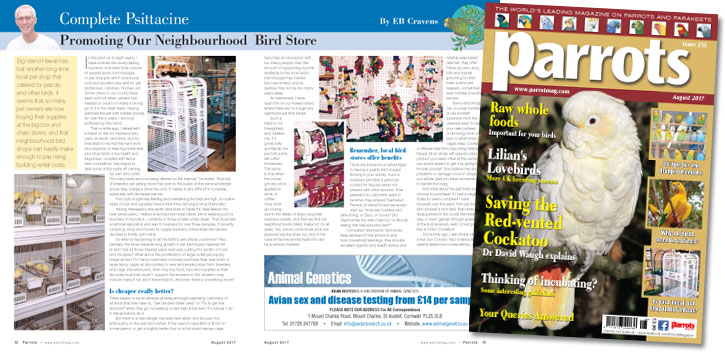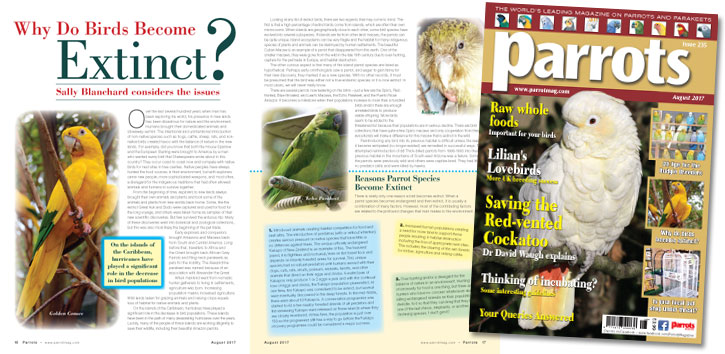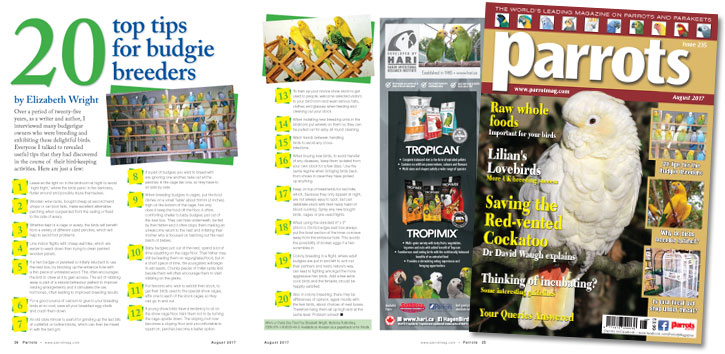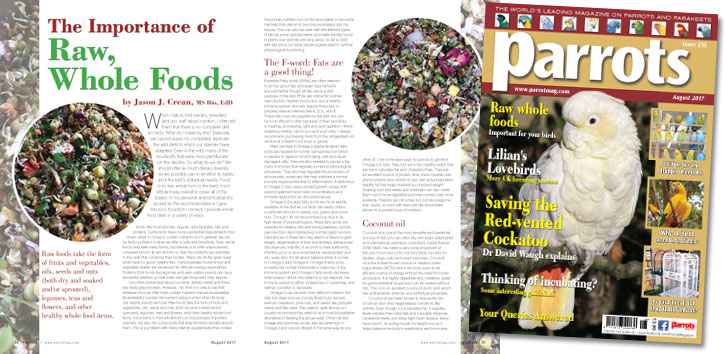
Complete Psittacine by Eb Cravens
Big Island Hawaii has lost another long-time local pet shop that catered for parrots and other birds. It seems that so many pet owners are now buying their supplies at the big box and chain stores, and that neighbourhood bird shops can hardly make enough to pay rising building rental costs.
In the past six to eight years, I have noticed the slowly fading business and even total closure of several exotic bird shoppes or pet shoppes which previously sold and stocked very well for pet psittacines, canaries, finches, etc. Some others in our county have been sold off when owners lost interest or could not make a strong go of it in the retail trade. Having watched the pet bird market closely for over thirty years, I am truly bothered by this trend.
Buy Now!

Sally Blanchard considers the issues
Over the last several hundred years when man has been exploring his world, his presence in new lands has been disastrous for nature and the environment. Humans brought their domesticated animals and stowaway vermin. The intentional and unintentional introduction of non-native species such as hogs, cattle, sheep, rats, and non-native birds created havoc with the balance of nature in the new lands. For example, did you know that both the House Sparrow and the European Starling were brought to America by a man who wanted every bird that Shakespeare wrote about in this country? They occur coast to coast now and compete with native birds for nest sites in tree cavities. Native peoples have always hunted the food sources in their environment, but with explorers came new people, more sophisticated weapons, and most often, a disregard for the indigenous traditions that had often allowed animals and humans to survive together.
From the beginning of time, explorers to new lands always brought their own animals and plants and took some of the animals and plants from new worlds back home. Some, like the extinct Great Auk and Dodo were captured and used for food for the long voyage, and others were taken home as samples of their new scientific discoveries. But few survived the arduous trip. Many of these discoveries went into botanical and zoological collections, but this was also most likely the beginning of the pet trade.
Buy Now!

by Elizabeth Wright
Over a period of twenty-five years, as a writer and author, I interviewed many budgerigar owners who were breeding and exhibiting these delightful birds. Everyone I talked to revealed useful tips that they had discovered in the course of their bird-keeping activities. Here are just a few:
1: Leave an 8w light on in the birdroom at night to avoid ‘night fright,’ where the birds panic in the darkness, flutter around and possibly injure themselves.
2: Wooden wine racks, bought cheap at second hand shops or car boot fairs, make excellent alternative perching when suspended from the ceiling or fixed to the side of aviary.
Buy Now!

by Jason J. Crean, MS Bio, EdD
When I talk to bird owners, breeders, and zoo staff about nutrition, I often tell them that there is no 'complete' diet for birds. What do I mean by this? Basically, we cannot expect to completely replicate the wild diets to which our species have adapted. Even in the wild, many of the foodstuffs that were once plentiful are on the decline. So what do we do? We should offer as much dietary diversity as we possibly can in an effort to satisfy all of the bird’s individual needs. Food in its raw, whole form is the best, most efficient way overall to cover all of the bases. In my personal animal husbandry, as well as the recommendations I give the zoos for which I consult, I provide whole food diets in a variety of ways.
Birds, like most animals, require carbohydrates, fats and proteins. Some birds have more substantial requirements than others when it comes to certain nutrients but in general, we can be fairly confident in what we offer is safe and beneficial. Raw, whole foods may take many forms, but the key is to offer unprocessed, unheated food in its whole form so that the nutrients are available to the cells that compose their bodies. Many oils fill the great need birds have for good, healthy fats. Carbohydrates found in fruit and vegetable matter are necessary for efficient energy expenditure. Proteins from foods like legumes and even edible insects can be a wonderful addition so that birds can get the protein they require.
Buy Now!




